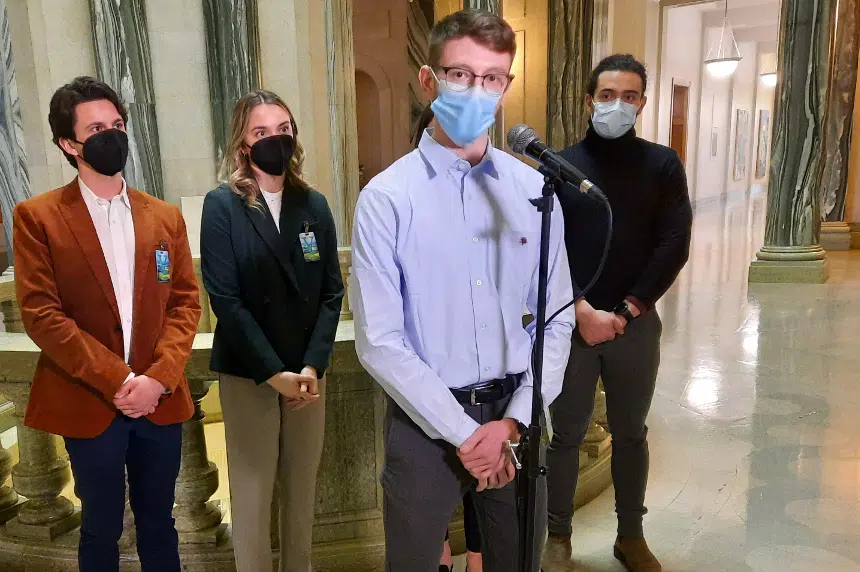A group of medical students from the University of Saskatchewan filled the gallery in the legislative assembly Wednesday afternoon, there to push on issues that have been described as “epidemics” and a “crisis” in Saskatchewan.
Ryan Krochak, with Students for Harm Reduction and Informed Policy (SHRIP), said the provincial government needs to directly fund safe drug consumption sites and needle exchanges in the province.
Krochak said the province is in the middle of HIV and hepatitis C epidemics, as well as an overdose crisis that is killing hundreds of people a year.
“More now than ever there (are) contaminated, illicit supplies of drugs and right now people are dying in Saskatchewan and we need to address it,” he said.
Krochak said he appreciates the provincial government has put some money into mental health and addictions, but thinks it could be taken a step further.
“It’s time to be proactive with our funding, not reactive. The reality is now we can supply people with clean needles and we can prevent the transmission of hepatitis C and HIV instead of paying for a lifetime of antiretrovirals,” Krochak said.
He said the health-care system is backlogged, particularly with COVID, and often when a person overdoses, they’re taken to an ER.
Krochak said directly funding things like harm reduction and needle exchanges makes both humanitarian sense and economic sense.
SHRIP is a group under the University of Saskatchewan’s medical students’ society. It started two years ago in response to the growing drug overdose problem in the province.
“It’s been a well-documented issue for some time now and after two budget cycles of no provincial funding, basically we stepped up and we’re just here to advocate for those who can’t advocate for themselves,” he said.
Krochak said he has shadowed in infectious disease at St. Paul’s Hospital in Saskatoon.
“It’s such a surreal moment, watching an attending physician break that news that a patient is now diagnosed with HIV. That’s a chronic infection, that’s a lifelong infection and it’s preventable,” said Krochak.
Mental Health and Addictions Minister Everett Hindley thanked the students for coming to the legislature, and talked about the money government has put into treatment beds and harm reduction efforts like the take-home Naloxone program and drug testing strips.
Hindley also said requests had been made regarding safe consumption site funding but no decisions had yet been made for the upcoming provincial budget, set to be released March 23.
“We’re focused on trying to make sure that we provide, with the resources that we have, as much support and programs and initiatives as we can to people across this province,” Hindley said.
Similar requests for funding for safe consumption sites have been made in the past two budgets and were rejected each time.
Vicki Mowat, the NDP’s health critic, said simply the provincial government isn’t doing enough on this front.
“The government has been dragging its feet and paying lip service to harm reduction for years now,” Mowat said.
She said a tour of the safe consumption site in Saskatoon last year highlighted how serious the overdose situation is. She said in the half-hour tour, the head of the site had to run to help someone who’d overdosed in the alley outside of business hours.
“We’re talking about saving people’s lives and that’s the first step to helping people get back on track to get the help that they need. (The first step) is that they need to be alive long enough to get that help,” Mowat said.
According to Mowat, what has been put toward harm reduction is a drop in the bucket of what’s needed. She said what’s needed is dedicated funding.
What Mowat has heard from those running sites is things like expanded hours and having trained people on site would make a really big difference – and those things require funding.











